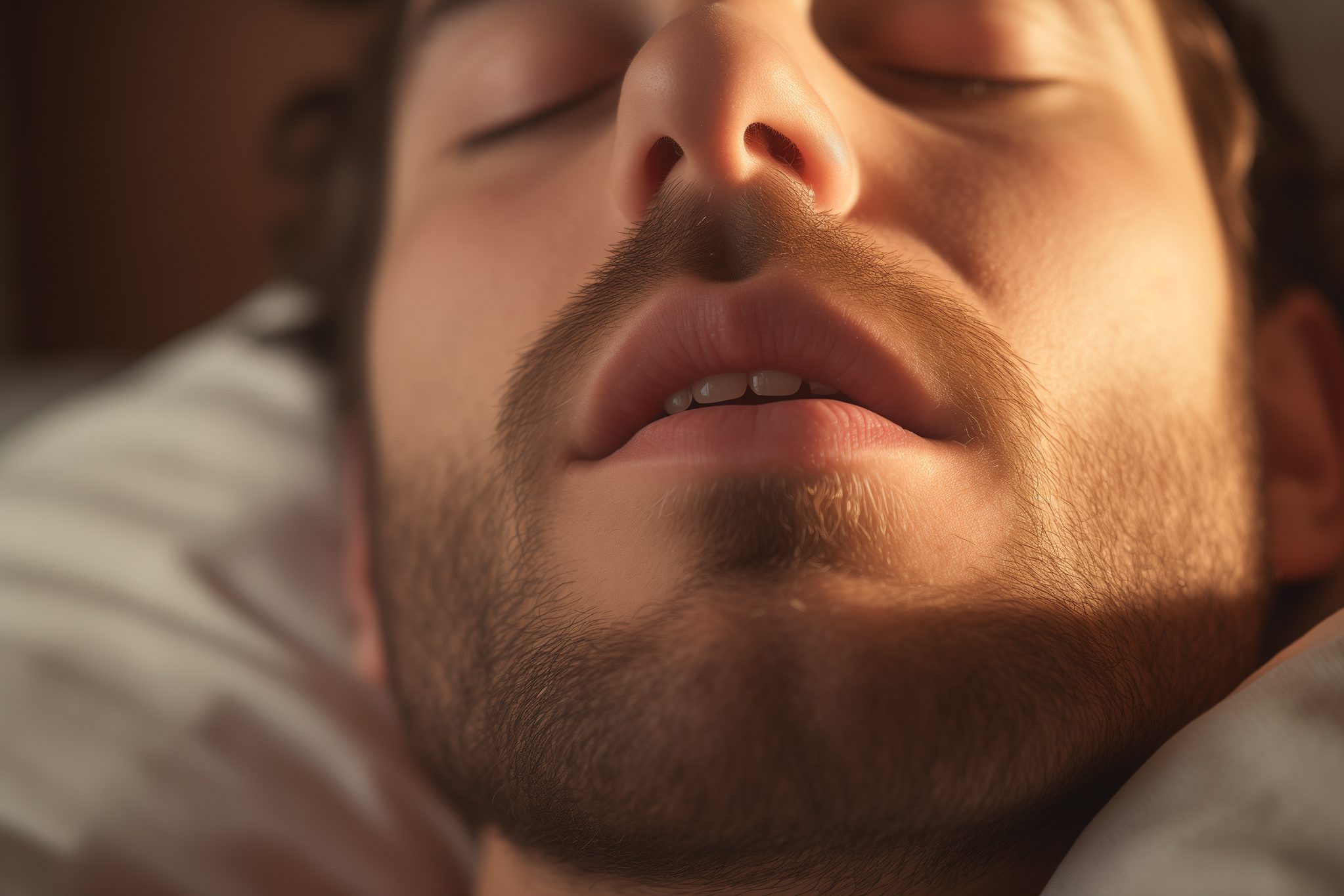
How Snoring Works and How it Affects Sleep Quality and Overall Health
Understanding why snoring happens, how it can affect your sleep, and how to deal with it can help lead to improved sleep and reduce tension between sleep partners.

Snoring is a common nighttime breathing issue—it affects about 25% of children, 40% of adult women, and 57% of adult men. Snoring can range from mild and occasional to chronic and severe. In most instances, snoring is simply irritating and disruptive for sleep partners and roommates. But, in some cases, it can be indicative of a more serious sleep disorder such as sleep apnea.
Why Do People Snore?
When sleeping, the muscles surrounding the airway in the back of the throat loosen, which narrows the airway. The relaxed tissue then flutters and vibrates with each breath, causing an audible snoring noise.
Some people are predisposed to snoring based on the size and shape of their jawbones, muscles, and tissue in the neck and throat. However, there are several other factors that can cause snoring, such as:
Being overweight or obese
Pregnancy
Crooked nasal septum
Nasal polyps
Nasal congestion
Swelling in the tonsils, adenoids, soft palate, and/or uvula
Large tongue relative to mouth size
Alcohol use
Sedative medication use
Poor muscle tone due to aging or other factors
Sleeping on your back
Mouth breathing/sleeping with the mouth open
Snoring Severity Levels
There are three main classifications for snoring severity levels:
Light snoring
Snoring lightly and occasionally is considered normal and typically doesn’t require any intervention. It is often most impactful for sleeping partners or those in close proximity who might have their sleep occasionally disrupted by the noise. Light snoring can often be alleviated relatively easily.
Primary snoring
Primary snoring happens more than three nights per week and is more disruptive than light snoring. While this type of frequent snoring can be more disruptive to sleep partners, it typically doesn’t disturb the sleep of the snorer themselves and isn’t considered a medical issue.
Obstructive sleep apnea-related snoring
OSA-related snoring can be very disruptive and detrimental to sleep quality and quantity for the snorer and any sleep partners, and can negatively affect overall health as well.
It can be difficult to know if you snore if you sleep alone, unless you wake in the night with OSA symptoms like gasping or choking. If you aren’t sure whether you snore but you feel fatigued or have other symptoms of poor sleep, you may wish to set up a recording device in your sleeping space for a few nights.
How Snoring Affects Sleep and Overall Health
Light and primary snoring is generally benign and won’t affect your sleep or overall health. Again, the biggest impact will likely be on sleeping partners or roommates who experience sleep disruptions as a result of snoring noise. However, this can cause relationship tension and strife if the other person becomes chronically sleep deprived. They may suffer from daytime drowsiness, mood changes, trouble concentrating, and so forth.
However, OSA-related snoring can be much more serious. It can cause excessive daytime sleepiness, cardiovascular issues, high blood pressure, diabetes, stroke, depression, and cognitive impairment.
Getting enough quality sleep is crucial for our overall health, so excessive snoring or any other sleep disorder or disruption can have far-reaching effects.
Treatments to Help With Snoring
There are several different home remedies and types of treatment available to help alleviate snoring, including:
Maintain a healthy weight
Obesity and being overweight are leading contributors to snoring and can cause sleep apnea, so making lifestyle changes to achieve a healthy weight can significantly reduce snoring.
Minimize alcohol and sedative use
Alcohol and sedative medications can cause the muscles and tissues in the throat to relax more than normal during sleep, causing snoring. Limit use of these substances as much as possible (especially around bedtime) to help alleviate snoring.
Avoid sleeping on your back
Sleeping on your back can constrict your airway and allow your tongue to fall to the back of your throat, which often causes snoring. Sleeping on your side or stomach can help. It can be difficult to make this change if you are used to sleeping primarily on your back, but positioning yourself on your side with a pillow behind your back or sewing a tennis ball into the back of your sleep shirt can help train your body to sleep in other positions.
Elevate the head of your bed
Raising the head of your bed can reduce snoring as well, but it’s important to lift the entire mattress and not simply use more pillows as that can misalign your spine and lead to neck pain and other issues. Instead, use risers, wedge pillows, or an adjustable bed frame to lift the whole head of your bed. This can be particularly effective if you can’t sleep in any other position besides on your back.
Take steps to minimize nasal congestion
Congestion can be caused by allergies, dust, pet dander, and so forth, and in turn this can lead to increased snoring. Keep your sleeping space as clean as possible to minimize allergens, take allergy medication, or invest in breathing strips or internal nasal expanders to allow for easier breathing.
Use an anti-snoring mouthpiece
There are two main types of anti-snoring mouthpieces: mandibular advancement devices which hold the lower jaw forward, and tongue retaining devices which hold the tongue in place so it doesn’t fall back in the throat.
Build muscle tone
Mouth, tongue, and throat exercises can help strengthen muscles and reduce the chances of snoring. These exercises are most effective if they are completed daily for at least a couple of months.
All of the above treatments for snoring can be performed at home and don’t require a doctor’s intervention. However, if those prove ineffective, a doctor may prescribe the following:
Use a CPAP, BiPAP, or APAP device
These devices pump air through a hose and a wearable sleep mask to assist with breathing while sleeping. They are meant to treat diagnosed sleep apnea and apnea-related snoring, and require a doctor’s prescription as well as personal calibration.
Surgery
Surgery is generally a last resort to treat severe snoring or sleep apnea. A variety of surgeries can be performed depending on the exact cause of snoring. For example, someone might have a surgery to widen the airway, remove nasal polyps, correct a deviated septum, and so forth.
When to See a Doctor
If you haven’t noticed any particularly detrimental effects of your snoring, it’s not necessary to seek intervention and snoring can often be alleviated by taking steps on your own. However, if you notice any of these symptoms, it’s best to consult your doctor:
• Very loud, disruptive, or chronic snoring that can’t be relieved by the first 7 steps on the list above
• Snoring accompanied with snorting, choking, or gasping sounds or sensations
• Snoring brought on by recent weight gain
• Daytime drowsiness despite adequate sleep
• Difficulty concentrating or focusing
• Headaches and/or congestion in the morning that isn’t otherwise explainable
• High blood pressure
• Grinding your teeth in your sleep
• Needing to use the bathroom several times throughout the night
These symptoms can indicate sleep apnea or other sleep disorders and should be evaluated by your doctor to ensure that you get quality sleep and protect your overall health.
References
- Guicheng Zhang, Jeffery Spickett, Krassi Rumchev, Andy H Lee, Stephen Stick - Snoring in primary school children and domestic environment: a Perth school based study
https://pubmed.ncbi.nlm.nih.gov/15527500/ - Richard J. Schwab - Snoring
https://www.merckmanuals.com/professional/neurologic-disorders/sleep-and-wakefulness-disorders/snoring - Snoring - adults
https://medlineplus.gov/ency/patientinstructions/000720.htm - Obstructive sleep apnea - adults
https://medlineplus.gov/ency/article/000811.htm
FAQ
What is the role of genetics in determining whether someone snores?
Genetics can influence snoring by determining anatomical traits like throat structure, nasal passage size, and tongue positioning. Family history of snoring or sleep apnea also increases the likelihood of snoring. While genetics play a role, lifestyle factors such as weight and sleep habits are equally significant.
Does smoking or vaping worsen snoring?
Yes, smoking and vaping irritate the airway lining, causing inflammation and increased mucus production, which narrows the airways. This makes it harder to breathe freely during sleep, exacerbating snoring. Quitting smoking or vaping often improves snoring symptoms over time.
Does snoring always indicate poor sleep quality?
Not necessarily. Occasional snoring doesn’t always impact sleep quality, but frequent or loud snoring can signal disruptions, such as sleep apnea. These disruptions can reduce deep sleep stages, leaving individuals feeling tired even after a full night’s rest.
Can lifestyle changes alone resolve snoring in all cases?
Lifestyle changes, like losing weight, avoiding alcohol before bed, and sleeping on your side, can significantly reduce snoring for many people. However, they may not fully resolve snoring caused by structural issues, such as a deviated septum or enlarged tonsils, which might require medical intervention.
Does surgery completely eliminate snoring, or is there still a chance it will persist?
Surgery, such as uvulopalatopharyngoplasty (UPPP), can reduce snoring by altering throat structures. However, it doesn’t guarantee complete elimination, as factors like weight gain or aging may reintroduce snoring. Surgery is typically a last resort when other treatments fail.

Written by
Cat Caroll
Articulate Writer and Analytical Editor
Download Pillow
Get help
Press & News
Legal
Connect
X (Twitter)
Company
Copyright © Neybox Digital Ltd.



